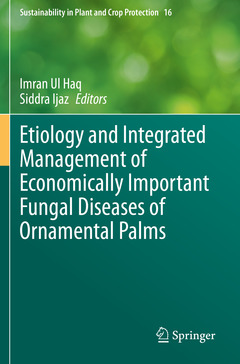Description
Etiology and Integrated Management of Economically Important Fungal Diseases of Ornamental Palms, 1st ed. 2020
Sustainability in Plant and Crop Protection Series, Vol. 16
Coordinators: Ul Haq Imran, Ijaz Siddra
Language: English
Subjects for Etiology and Integrated Management of Economically...:
Publication date: 11-2021
287 p. · 15.5x23.5 cm · Paperback
Publication date: 11-2020
287 p. · 15.5x23.5 cm · Hardback
Description
/li>Biography
/li>Comment
/li>
Historically it was general belief that plant pathogens are not associated with human diseases. Since 19th century, several clinical reports are available indicating many plant pathogenic fungi (Aspergillus spp., Penicillium spp., Alternaria spp., Trichoderma spp., Fusarium spp., Curvularia spp. and Colletotrichum Spp) as novel agents of human diseases. Besides the association of fungal plant pathogens infecting ornamental palms, harbouring any of earlier mentioned or other fungal species (capable of causing certain diseases in human beings or pets) by the ornamental palms cultivation (either grown indoor or outdoor) is an important area of research to be explored and addressed thoroughly.
This book will provide the deep information regarding major fungal diseases of ornamental palms, their symptoms, disease identification, and etiology and management strategies. This book will also provide unique knowledge regarding the ornamental palms harbouring kinds of human fungal pathogens and their practical management at domestic and commercial scale, in order to make cultivation of these plant more beneficial for humans, animals and environment.
Comprehensive book on emerging fungal diseases, their diagnosis, etiology and management of commercially important ornamental palm species based on classical and advanced molecular techniques
This book enables the reader to identify different important fungal diseases of ornamental palm species
Provides unique knowledge of different human fungal pathogens associated with indoor and outdoor ornamental plants
Provides practical solutions to manage fungal diseases of ornamental palms
These books may interest you

Palms and People in the Amazon 158.24 €

Palms and People in the Amazon 158.24 €


